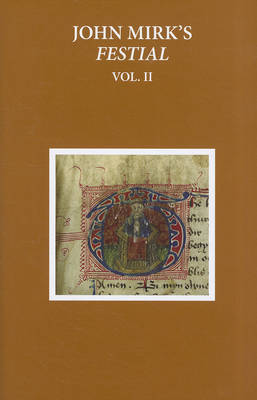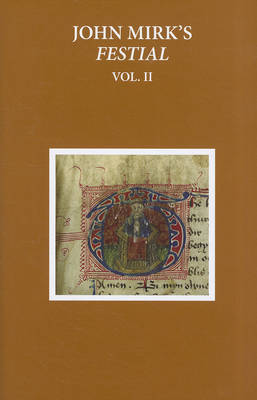
Door een staking bij bpost kan je online bestelling op dit moment iets langer onderweg zijn dan voorzien. Dringend iets nodig? Onze winkels ontvangen jou met open armen!
- Afhalen na 1 uur in een winkel met voorraad
- Gratis thuislevering in België vanaf € 30
- Ruim aanbod met 7 miljoen producten
Door een staking bij bpost kan je online bestelling op dit moment iets langer onderweg zijn dan voorzien. Dringend iets nodig? Onze winkels ontvangen jou met open armen!
- Afhalen na 1 uur in een winkel met voorraad
- Gratis thuislevering in België vanaf € 30
- Ruim aanbod met 7 miljoen producten
Zoeken
John Mirk's Festial
Edited from British Library MS Cotton Claudius A.II, Volume II
€ 106,95
+ 213 punten
Omschrijving
The Festial, most probably composed in the late 1380s by the Augustinian canon, John Mirk, of Lilleshall Abbey, Shropshire, was the most popular and influential collection of sermons in English in the late medieval and early Tudor period, surviving in many copies, and printed by Caxton and his successors. The collection was designed to be accessible and entertaining, as well as orthodox, to counter the success of Lollard preaching, and taught both the priests who used the sermons, as well as their audiences, the fundamentals of the Christian faith and doctrine, illustrated by many stories. The Festial is the only English sermon collection to be printed in England before the Reformation and is probably the most frequently printed work of its time before religious change made it unacceptable.
Specificaties
Betrokkenen
- Uitgeverij:
Inhoud
- Aantal bladzijden:
- 514
- Taal:
- Engels
- Reeks:
Eigenschappen
- Productcode (EAN):
- 9780199590377
- Verschijningsdatum:
- 1/09/2011
- Uitvoering:
- Hardcover
- Formaat:
- Genaaid
- Afmetingen:
- 218 mm x 142 mm
- Gewicht:
- 793 g

Alleen bij Standaard Boekhandel
+ 213 punten op je klantenkaart van Standaard Boekhandel
Beoordelingen
We publiceren alleen reviews die voldoen aan de voorwaarden voor reviews. Bekijk onze voorwaarden voor reviews.










